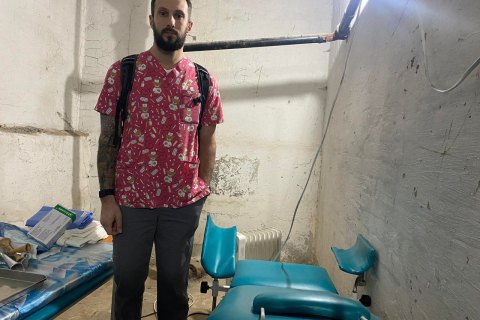The Perinatal Center's bomb shelter in Kyiv has an improvised ward. Gynecological chair, extension cord, two heaters, drinking water supply, diapers, blankets. There are wooden tubes to listen to the heartbeat instead of heart monitors that cannot be connected in a bomb shelter. In such conditions during the war, women continue to give birth under the threat of shelling.
The perinatal center continues to house mothers and pregnant women, and women with pregnancy pathologies. The medical staff always stays with them. When the air alarm goes on, everyone who can should go down to the bomb shelter.
One night the siren sounded again. Doctors hoped till the last moment that one of the patients would be able to hold on until the air alarm was switched off and give birth upstairs in the ward with comfortable conditions. But that did not happen.
- In fact, it is difficult to call these conditions comfortable, but we are used to it, - says Kyrylo Ventskovsky. - At that moment, everyone worked well: both the midwife and the neonatologist. We were lucky that it was physiological childbirth without complications and that everything was fine with the woman.
Two days later, doctors discharged the mother and baby. Later, the parents called and talked to the medical staff, saying they were fine. The newborn boy was named Fedir.

For 16 years of experience as an obstetrician-gynecologist, Kyrylo had assisted in childbirth in such conditions for the first time.
It was not scary; we just worked and were happy when the child cried. And then, after a while, I thought, what if I suddenly needed a vacuum or forceps, or anything else? The doctor from the pediatric ICU was in another bomb shelter with premature babies. If he was needed, it would be necessary to yell down the street so that he could run to us.
Kyrylo says that there is nothing complicated about his work now. It's hard only emotionally. The team is united; volunteers bring food, essentials for pregnant women, hygiene products. The hardest thing is opening the news and reading about Kharkiv, Mariupol, and other cities.
- I could never imagine that there would be explosions in Kyiv. Yes, I read the news in English that there would be an invasion, that there would be an attack. But it seemed that this was informational pressure on the aggressor country. That this was not that much about us as about implementation of sanctions, raising awareness. And when it all started, it seemed to me that it was unrealistic.
Kyrylo says that even if the situation in Kyiv becomes worse than it is now, he does not plan to evacuate.
- I do not consider myself a hero because the heroes are our boys and girls who are now at the frontline. Now I would like the world community to close the sky over Ukraine. We are grateful for the sanctions, the humanitarian aid, the pressure on Russia. Still, we need to make sure [russians] stop firing missiles on our cities and stop dropping bombs on civilians.
Kyrylo Ventskovsky remembers hearing explosions in Kyiv on 24 February 2022. He did not realize what it was, so he started to read the news. Later he got ready and went to work.
- I met a neighbour, and he asked where I was going with my backpack. I replied that I was going to work. And he asked me: "Did not you read the news?" I read, but I still had to get to work.
Since then, Kyrylo has been home only once, a week after the Russian invasion began. He took clean clothes a toothbrush. He visited his grandparents twice to bring them medicine.
We will understand the difficulty of the situation only when peace comes, and we will go home and sleep at night in our beds.








